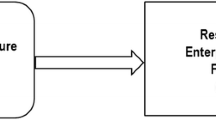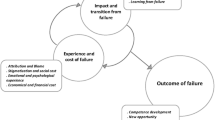Abstract
Most of the current courses and textbooks in entrepreneurship focus on promoting start-up desirability and feasibility. We call for a more balanced approach to entrepreneurship education and training by developing a sense of success and a sense of failure among would-be entrepreneurs. The sense of success acts of a promotion of entrepreneurial behaviour and encompasses elements such as the start-up intentions, expectations and ability. Conversely, the sense of failure acts as prevention and draws on negative experience, responsibility and awareness of pitfalls. We posit that the combination of both senses can reduce the large number of business failures which leads to huge economic, political and psychological losses. In addition, this approach might help failed entrepreneurs to come to terms with their grief and re-start a venture.
Similar content being viewed by others
References
Ahlstrom, D. & Bruton, G. D. (2004). Guest editors’ introduction to special issue. Turnaround in Asia: laying the foundation for understanding this unique domain. Asia Pacific Journal of Management, 21 (1/2), 5–24
Bandura, A. (1997). Self-efficacy: The exercise of control. New York: Freeman
Bauer, J. Gartmeier, M. & Harteis, C. (2012). Human fallability and learning from errors at work. In: J. Bauer & C. Harteis (Eds.): Human fallibility: The ambiguity of errors for work and learning. Dordrecht: Springer
Baumard, P. & Starbuck, W. H (2005). Learning from failures: Why it may not happen. Long Range Planning, 38, 281–298
Bazerman, M. H. (2002). Judgement in Managerial Decision Making. Hoboken, NJ: Wiley
Breakwell, G. M. (2007). The psychology of risks. An introduction. Cambridge: Cambridge University Press
Brockner, J. Higgins, T. & Low, M. B. (2004). Regulatory focus theory and the entrepreneurial process. Journal of Business Venturing, 19, 203–220
Bröckling, U. (2007). Das unternehmerische Selbst. Soziologie einer Subjektivierungsform. Frankfurt a. M.: Suhrkamp
Bryant, P. (2007). Self-regulation and decision heuristics in entrepreneurial opportunity evaluation and exploitation. Management Decision, 45(4), 732–748
Bryant, P. & Dunford, R. (2008). The Influence of Regulatory Focus on Risky Decision-Making. Applied Psychology: An International Review, 57(2), 335–359
Burandt, M. D. & Kanzek, T. (2010). Unternehmertum — Psychologische Aspekte eines volkswirtschaftlichen Themas. Psychologische Expertise für Erfolgreiches Unternehmertum in Deutschland. Berlin: Berufsverband deutscher Psychologinnen und Psychologen
Caliendo, M.; Fossen F. M. & Kritikos, A. S. (2009). Risk Attitudes of Nascent Entrepreneurs — New Evidence from an Experimentally-Validated Survey. Small Business Economics, 32(2), 153–167
Cannon, M. D. & Edmonson, A. C. (2001). Confronting Failure: Antecedents and Consequences of Shared Belief about Failure in Organizational Work Groups. Journal of Organizational Behavior, 22, 161–177
Casas, T.; Volery, Th. & Hilb, M. (2010). Living-dead entrepreneurs. Paper presented at the Recontres de St. Gall 2010. St. Gallen
Cassar, G. (2010). Are individuals entering self-employment overly optimistic? An empirical test of plans and projections on nascent entrepreneur expectations. Strategic Management Journal, 31, 822–840
Cope, J. (2011). Entrepreneurial learning from failure: An interpretative phenomenological analysis. Journal of Business Venturing, 26, 604–623
Cressy, R. (2006). Why do most firms die young? Small Business Economics, 26(2), 103–116
Daniel, K. D., Hirshleifer, D. & Subrahmanyan, A. (2001). Overconfidence, arbitrage and equilibrium asset pricin. Journal of Finance, 61(3), 201–11
Dembinski, P. H. (2002). Auf der Suche nach Konkursursachen. Zeitschrift für Klein- und Mittelunternehmen, 50 (4), 238–257
DeTienne, D. & Cardon, M. S. (2007). Entrepreneurial exit as an important component of the entrepreneurial process: Strategies and design. In: A. Zacharakis (Ed.): Frontiers of Entrepreneurship Research. Wellesley, MA: Babson College Center
Dun, Bradstreet (2011). Firmenkonkurse und Gründungen per September 2011. http://www.dnb.ch/htm/810/de/Pressemitteilungen.htm (28.2.12)
EACEA [Education, Audio-visual and Culture Executive Agency] (2012). Entrepreneurship education at school in Europe: National strategies, curricula and learning outcomes. Brussels, 2012
European Commission (2012). Effects and impact of entrepreneurship prgrammes in higher education. Entrepreneurship Unit, DG Enterprise and Industry. Brussel, 2012
Freiling, J. & Wessels, J. (2010). Das Scheitern junger Unternehmer im Spiegel der Entrepreneurship-Theorie. Wirtschaftspolitische Blätter, 57(3), 315–332
Folkman, S.; Lazarus, R.; Dunkel-Schetter, D. et al. (1986). The dynamics of a stressful encounter: cognitive appraisal, coping and encounter outcomes. Journal of Personality and Social Psychology, 50, 992–1003
Forster, J.; Grant, H.; Idson, C. L. et al. (2001). Effects of success and failure on motivational strength: Regulatory focus as moderator. Journal of Experimental Social Psychology, 37, 253–260
Fueglistaller, U.; Müller, C.; Müller, S. et al. (2012). Entrepreneurship, Modelle — Umsetzung — Perspektiven. Wiesbaden: Gabler (3. Aufl.)
Gigerenzer, G. (2008). Bauchentscheidungen. — Die Intelligenz des Unbewussten und die Macht der Intuition. München: Goldmann
Gigerenzer, G.; Hoffrage, U. & Kleinbolting, H. (1991). Probabilistic mental models: a Brunswikian theory of confidence. Psychological Review, 98, 506–28
Gigerenzer, G.; Todd, P. M. & ABC Research Group (1999). Simple heuristics that make us smart. New York: Oxford University Press
Griffin, D. W. & Tversky, A. (1992). The weighting of evidence and the determination of confidence. Cognitive Psychology, 24, 411–35
Hertwig, R. & Pleskac, T. J. (2010). Decisions from experience: Why small samples? Cognition, 115(2), 225–237
Hertwig, R. (2012). Tapping into the wisdom of the crowd — with confidence. Science, 336, 303–304
Higgins, E. T. (1998). Promotion and prevention: Regulatory focus as a motivational principle. Advances in Experimental Social Psychology, 30, 1–46
Higgins, E. T.; Friedman, R.; Harlow, R. et al. (2001). Achievement orientations from subjective histories of success: promotion pride versus prevention pride. European Journal of Social Psychology, 31, 3–23
Hmieleski, K. M. & Baron, R. A. (2008). Regulatory focus and new venture performance: A study of entrepreneurial opportunity exploitation under conditions of risk versus uncertainty. Strategic Entrepreneurship Journal, 2, 285–299
Hmieleski, K. M. & Baron, R. A. (2009). Entrepreneurs’ optimism and new venture performance: A social cognitive perspective. Academy of Management Journal, 52(3), 473–488
Holtz-Eakin, D.; Joulfaian, D. & Rosen, H. S. (1994). Sticking it out: Entrepreneurial survival and liquidity constraints. The Journal of Political Economy, 102 (1), 53–75
Kinicki, A. J.; Prussia, G. E. & McKee-Ryan, F. M. (2000). A panel study of coping with involuntary job loss. Academy of Management Journal, 43(1), 90–100
Kirchler, E. M. (2011). Wirtschaftspsychologie: Individuen, Gruppen, Märkte, Staat. Göttingen: Hogrefe, 4. Aufl.
Kirzner, I. (1973). Competition and Entrepreneurship. Chicago: Chicago University Press
McClelland, D. C. (1967). The Achieving Society, New York: Free Press
McCombs, B. L. (1991). Motivation and lifelong learning. Educational Psychologist, 26(2), 117–127
McGrath, R. G. (1999). Failing forward: Real options reasoning and entrepreneurial failure. Academy of Management Review, 24(1), 13–30
Meyer, M. W. & Zucker, L. (1989). Permanently Failing Organizations. Newbury Park, CA: Sage
Oser, F. & Spychiger, M. (2005). Lernen ist schmerzhaft. Zur Theorie des negativen Wissens und zur Praxis der Fehlerkultur. Weinheim: Beltz
Palich, L. & Bagby, D. (1995). Using cognitive theory to explain entrepreneurial risk-taking: Challenging conventional wisdom. Journal of Business Venturing, 10, 425–438
Van Praag, M. (2003). Business Survival and Success of Young Small Business Owners. Small Business Economics, 21, 1–17
Reynolds, P. D. (1997). Who Starts New Firms? Preliminary Explorations of Firms-in-Gestation. Small Business Economics, 9, 449–462
Rotefoss, B. & Kolvereid, L. (2005). Aspiring, nascent and fledgling entrepreneurs: An investigation of the business start-up process. Entrepreneurship & Regional Development, 17, 109–127
Sarasvathy, S. D. (2004). Making it happen: beyond theories of the firm to theories of firm desing. Entrepreneurship Theory and Practice, 28(6), 519
Small Business Administration (SBA) (2012), Office of Advocacy, Frequently Asked Questions, http://www.sba.gov/advo/stats/sbfaq.pdf.
Schaper, M.; Volery, T. & Weber, P. (2011). Entrepreneurship and Small Business: 3rd Asia-Pacific Edition, Milton: Wiley
Schulte, R. (2011). Unternehmerische Desillusionierung nach einer Existenzgründung. Zeitschrift für KMU und Entrepreneurship, 59, 149–167
Sedor, L. M. (2002). An explanation for unintentional optimism in analysts’ earnings forecasts. Accounting Review, 77(4), 731–753
Shane, S. (2003). A General Theory of Entrepreneurship: The Individual-Opportunity Nexus. Aldershot: Elgar
Shepherd, D. A. (2003). Learning from business failure: propositions of grief recovery for the self-employed. Academy of Management Review, 28, 318–328
Shepherd, D. A. (2004). Educating entrepreneurship students about emotion and learning from failure. Academy of Management Learning and Education, 3(3), 274–287
Shepherd, D. A.; Wiklund, J. & Haynie, J. M. (2009). Moving forward: Balancing the financial and emotional costs of business failure. Journal of Business Venturing, 24, 134–148
Sitkin, S. B. (1992). Learning through failure: The strategy of small losses. In: B. M. Staw & L. L. Cummings (Eds.): Research in organizational behaviour, Vol. 14. Greenwich, CN: JAI Press
Sitkin, S. B. & Weingart, L. R. (1995). Determinants of risky decision-making behavior: A test of the mediating role of risk perceptions and propensity. Academy of Management Journal, 38(6), 1573–1592
Singh, S.; Corner, P. & Pavlovich, K. (2007). Coping with entrepreneurial failure. Journal of Management and Organization, 13 (4), 331–344
Sommer, S. & Wittrock, O. (2011). Mist gebaut: Fehlerhafte Produkte sind schlecht fürs Image und verursachen immense Kosten. Doch nur wenige Unternehmen sind gegen solche Schäden versichert. Impulse, Juli, 97–101
Souitaris, V.; Zerbinati, S. & Al-Laham, A. (2007). Do entrepreneurship programmes raise entrepreneurial intentions of science and engineering students? The effects of learning, inspiration and resources, Journal of Business Venturing, 22(4), 566–591
Thaler, R. H. (1991). Quasi-rational economics. New York: Sage
Tversky, A. & Kahneman, D. (1974). Judgment under uncertainty: Heuristics and biases. Science, 185, 1124–1131
Van Witteloostuijn, A. (1998). Bridging behavioral and economic theories of decline: organizational inertia, strategic competition and chronic failure. Management Science, 44 (4), 502–519
Wickham, P. A. (2006). Overconfidence in new start-up success probability judgment. International Journal of Entrepreneurial Behaviour and Research, 12 (4), 210–227
Wilkinson, A. & Mellahi, K. (2005). Organizational failure: Introduction to the special issue. Long Range Planning, 38(3), 233–238
Author information
Authors and Affiliations
Corresponding author
Additional information
«And yet I felt as if I sensed all around me the smell of something ominous which elude me» (Umberto Eco)
Rights and permissions
About this article
Cite this article
Oser, F., Volery, T. «Sense of failure» and «sense of success» among entrepreneurs: the identification and promotion of neglected twin entrepreneurial competencies. Empirical Res Voc Ed Train 4, 27–44 (2012). https://doi.org/10.1007/BF03546505
Published:
Issue Date:
DOI: https://doi.org/10.1007/BF03546505




